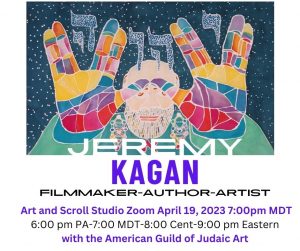
Renowned Filmmaker and Author featured on the Season Finale of Art and Scroll Studio, in conjunction with the American Guild of Judaic Art.
Professor Jeremy Kagan is well-versed in creating stories that move. As a filmmaker and professor, he excels in the art and craft of making narratives come alive. Whether the source material is a book or a script, he teases the essence of the emotional content and conveys it in a way that will move the viewer. He is an internationally recognized director/writer/producer of feature films and television and a well-known teacher. He has made many movies about Jewish subjects and worked with many Jewish actors, including “The Chosen” with Richard Dreyfuss.
One story that had never been before his lens was the Torah. He was drawn to creating a visual midrash, an artistic work that would capture the essence of the Torah portion.
On April 19, 2023, at 7:00 pm MDT, he will be the special guest on the season finale of the Art and Scroll Studio Zoom series on Judaica art.
“On my iPad, I’ve been drawing a visual response to this week’s Torah portion and the Midrash about it. I do this every week, and over the last few years, I’ve made five sets of these drawings. The first set started on a whim. I learned some odd stories about the first parsha Beresheit. One Midrash described the snake as a tall creature on two legs with a long neck and a lust for Eve. I had just learned an ancient Indian painting technique on stretched silk and decided to illustrate this creation story.”
Every week in synagogues worldwide, a section of the Torah is read. The Torah is divided into 54 portions – called Parshas. After each parsha, a selection from the prophets is also read, and these are called the Haftorah. His paintings and drawings are responses not only to the text of the Torah and Haftorah but also to the rabbinic commentary in Talmud and Mishnah and to apocrypha that have emerged over the centuries.
“I created the first set of paintings and pencil caricatures from the Haftorah over six years. I was at the time working as a filmmaker. Over the last four years using the iPad, I have done a second set of visual responses, and I am presently working on the third set.”
Rabbis write that there are multiple meanings for each word in Torah, starting with the literal and moving toward the more subtle and esoteric. As a language, Hebrew offers interweaving permutations as each letter has symbolic and even numerical values, all of which give rise to much interpretation of the text.
“In many paintings, there are references to the Kabbalah and its imagery. Kabbalah is the spiritual path of Judaism. It provides meditative, mystical and practical guidance. It is a vast field of knowledge and experience. And in much of the imagery, there are reflections of Kabbalistic concepts, including a basic one that has a visual component called the “Etz Chaim” – the tree of life, and it divides into ten energy-like centers called Sephirot that are part of this tree. Each of these has colours associated with it.”
Making images from these inspired words is a challenge. At one time, because of the second commandment, which forbids making idols, image-making was frowned upon until the last two centuries when Jewish graphic artists began to express themselves. He took on these projects as a personal assignment to draw for each week.
“It has been fun, a challenge, and an opportunity to get closer to Torah. I must admit these images are mostly surface and just touching the edges of the depth one could go into the teachings.”
It is said that everyone should write a copy of the Torah during their lifetimes. These are his versions. He hopes the images entertain, provoke and inspire viewers to examine further insights and encourage people to explore these remarkable writings.
“Each illustration draws me closer to my history, our history, my family, and our ancestors and reminds me of the ethics, imagination, and abiding courage of our sages and our people. I have had the gift of being a Jew in America.”
He comments that he has had the fortune of grandparents who risked immigration and the unknown, leaving Europe and probably escaping death in the Holocaust. His family tree returns to rabbis on all sides for hundreds of years. They were all orthodox and may not have approved of his drawings. “But I am in their debt for bringing me here where I have had the blessings, as is said in morning prayers, of kindness, mercy and grace to be a creative being. And I am grateful.”
Professor Kagan teaches graduate courses at the School of Cinematic Arts at USC and has created the Change Making Media Lab, which specializes in developing and creating Entertainment Education (EE) emphasizing the values of narrative dramas and comedies to motivate behaviour change successfully.
Some of his feature credits include the box-office hits “Heros” with Henry Winkler, the political thriller THE BIG FIX with Richard Dreyfuss, THE CHOSENfrom Chaim Potok’s classic novel, and THE JOURNEY OF NATTY GANN. His many television shows are KATHERINE: The Making of an American Revolutionary and HBO’s CONSPIRACY: THE TRIAL OF THE CHICAGO 8. Among his other television films are DESCENDING ANGEL, about former Nazi criminals disguising themselves in the US and COLOR OF JUSTICE with Judd Hirsh, about racism.
